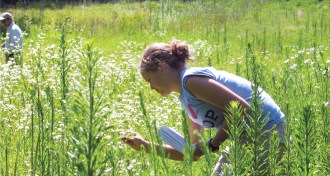Ecosystems
-
 Life
LifeVictorian zoological map redrawn
Species distribution patterns that inspired Darwin and Wallace get an update.
By Susan Milius -
 Tech
TechAntarctic test of novel ice drill poised to begin
Any day now, a team of 40 scientists and support personnel expects to begin using a warm, high pressure jet of water to bore a 30 centimeter hole through 83 meters of ice. Once it breaks through to the sea below, they’ll have a few days to quickly sample life from water before the hole begins freezing up again. It's just a test. But if all goes well, in a few weeks the team will move 700 miles and bore an even deeper hole to sample for freshwater life that may have been living for eons outside even indirect contact with Earth’s atmosphere.
By Janet Raloff -
 Humans
HumansWarning to bats: Cuddle not
Ecologist Kate Langwig of Boston University and her colleagues want Eastern bats to listen up: No more cuddling — at least during hibernation. Just keep those wings to yourselves.
By Janet Raloff -
 Ecosystems
EcosystemsChanging seasons inspire science
Researchers are tapping into the wealth of observations being made by citizen scientists nationwide. One of the largest repositories of such data is maintained by the USA National Phenology Network.
By Sid Perkins -
 Life
LifeBlue-green algae release chemical suspected in some amphibian deformities
Retinoic acid levels high in waterways rich in cyanobacteria blooms.
By Susan Milius -
 Animals
AnimalsBat killer hits endangered grays
The news on white-nose syndrome just keeps spiraling downward. The fungal infection, which first emerged six years ago, has now been confirmed in a seventh species of North American bats — the largely cave-dwelling grays (Myotis grisecens). The latest victims were struck while hibernating this past winter in two Tennessee counties.
By Janet Raloff -
 Ecosystems
EcosystemsDarwin’s Devices
What Evolving Robots Can Teach Us About the History of Life and the Future of Technology, by John Long.
-
 Animals
AnimalsBetter bird nesting also good for giant manta rays
Disrupting tree canopies on a Pacific atoll discourages big fish off shore through a long chain of ecological consequences.
By Susan Milius -
 Life
LifeClimate change may leave many mammals homeless
In some places over the next century, projected warming threatens the survival of more than one in three species.
By Janet Raloff -
 Humans
HumansBat killer is still spreading
Since 2006, some 6 million to 7 million North American bats have succumbed to white-nose syndrome, a virulent fungal disease. That figure, issued in January by the U.S. Fish & Wildlife Service, at least sextupled the former estimate that biologists had been touting. But the sharp jump in the cumulative death toll isn’t the only disturbing new development. On April 2, scientists confirmed that white-nose fungus has apparently struck bats hibernating in two small Missouri caves. The first signs of clinical disease have also just emerged in Europe.
By Janet Raloff -
 Humans
HumansYet another study links insecticide to bee losses
Since 2006, honeybee populations across North America have been hammered by catastrophic losses. Although this pandemic has a name — colony collapse disorder, or CCD — its cause has remained open to speculation. New experiments now strengthen the case for pesticide poisoning as a likely contributor.
By Janet Raloff -
 Life
LifeRising carbon dioxide confuses brain signaling in fish
Nerve cells respond to acidifying waters.
By Janet Raloff